Delivery workers grapple with danger after dozens injured in blazes that can spread quickly and suddenly
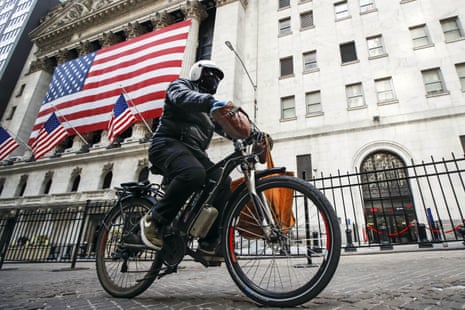
A delivery worker rides his e-bike in March 2020.
Photograph: John Minchillo/AP
Wilfred Chan in New York
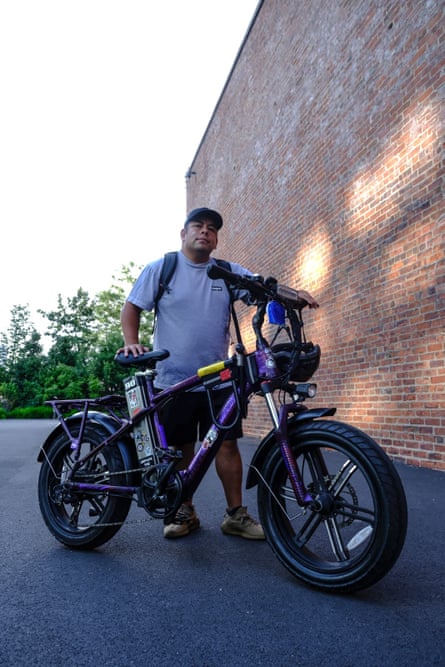
Wilfred Chan in New York
THE GUARDIAN
Tue 15 Nov 2022 06.00 GMT
New York City delivery workers have to deal with an array of threats: speeding cars, volatile weather, armed robbers and app algorithms that can “deactivate” them if they don’t rush to customers quickly enough. Lately, workers have added another to the list – their electric bikes bursting into flames.
The powerful lithium ion batteries used in small electric vehicles are responsible for a growing epidemic of fires. This year, there have been about 200 fires and six deaths, according to the New York City fire department. This month, an e-bike fire inside a Manhattan high-rise apartment became an inferno that injured nearly 40 people and forced firefighters to evacuate residents using ropes.
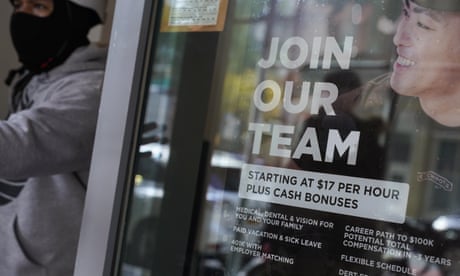
This job pays $60,000 – or maybe $150,000: companies skirt New York salary law
These fires can spread quickly and suddenly: “We have a fully formed fire within a matter of seconds,” the chief fire marshal said at a news conference.
That’s become a daily concern for delivery workers such as Delores Solomon, a 64-year-old Brooklyn resident who has been working for Uber Eats for about two years to supplement her social security benefits. Solomon said she “lives in fear” that her vehicle might catch fire while it’s charging or even while she’s riding it. Last year, while delivering food on her mobility scooter, Solomon hit a pothole, causing the battery to fly out and hit the pavement, where it burst into flames. “It was like a big popping sound,” she told the Guardian. “It scared me – like, ‘Damn, if that would’ve happened on the bike, I would’ve been blown up.’”
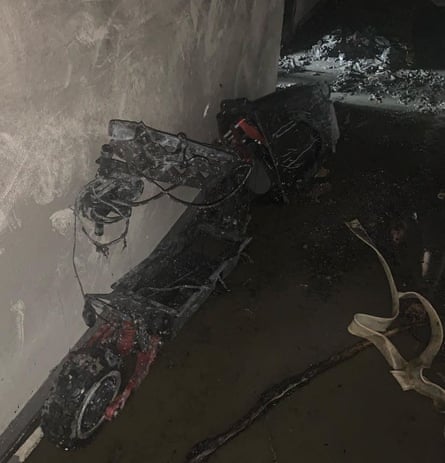
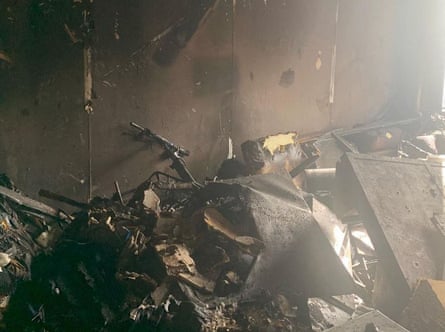
New York City delivery workers have to deal with an array of threats: speeding cars, volatile weather, armed robbers and app algorithms that can “deactivate” them if they don’t rush to customers quickly enough. Lately, workers have added another to the list – their electric bikes bursting into flames.
The powerful lithium ion batteries used in small electric vehicles are responsible for a growing epidemic of fires. This year, there have been about 200 fires and six deaths, according to the New York City fire department. This month, an e-bike fire inside a Manhattan high-rise apartment became an inferno that injured nearly 40 people and forced firefighters to evacuate residents using ropes.

This job pays $60,000 – or maybe $150,000: companies skirt New York salary law
These fires can spread quickly and suddenly: “We have a fully formed fire within a matter of seconds,” the chief fire marshal said at a news conference.
That’s become a daily concern for delivery workers such as Delores Solomon, a 64-year-old Brooklyn resident who has been working for Uber Eats for about two years to supplement her social security benefits. Solomon said she “lives in fear” that her vehicle might catch fire while it’s charging or even while she’s riding it. Last year, while delivering food on her mobility scooter, Solomon hit a pothole, causing the battery to fly out and hit the pavement, where it burst into flames. “It was like a big popping sound,” she told the Guardian. “It scared me – like, ‘Damn, if that would’ve happened on the bike, I would’ve been blown up.’”


Damage inside a residential building that caught fire in the Manhattan borough of New York. Photograph: Fire Department of New York/AFP/Getty Images
As the densest city in America, New York is a micro-mobility haven. Here, small electric vehicles aren’t toys for weekend jaunts but vital tools for the estimated 65,000 delivery workers trying to scrape a living through low-paying apps.
There are thousands of choices today if you want an e-bike, e-scooter or e-moped. Some of the high-end, name-brand machines are sold in beautiful downtown showrooms for well over $5,000. But many of the vehicles used by New York City’s workers come from unknown manufacturers and are sold online or through small shops for between $1,000 and $2,000.
Nearly all of these vehicles are powered by lithium ion battery packs, which contain tightly bundled cells that store energy as flammable chemicals. Typically, the cells are kept in sync by a piece of electronic circuitry called a battery management system, or BMS, which makes sure that the cells don’t overcharge or release too much energy at once. But that careful balance can get disrupted due to damage, wear or faulty manufacturing, sometimes with dangerous results.
In August, a lithium ion battery fire that erupted after 2am killed a child and her mother in their Harlem apartment. A big reason the fires keep happening is that workers have few options to charge their vehicles. Many charge their batteries in their own apartments and hope for the best. Others rent a spot from one of Manhattan’s e-bike stores, where shops charge dozens of batteries next to each other on makeshift racks. Some people strike up deals with their neighborhood bodegas.
Solomon, who lives on the third floor of a brownstone, is afraid to charge her battery indoors. So she uses two extension cords plugged into one another, dangling nearly 50ft to her bike parked in the building’s front yard – which she knows is still a risk. “Sometimes you might fall asleep and then it’s the next day, and thank God the battery didn’t explode or anything.”
Gustavo Ajche, the founder of Los Deliveristas Unidos, a prominent delivery worker labor group, told the Guardian he uses a parking space inside a private garage that the garage has set up as a charging station. Ajche splits the space with about 20 other workers and has to pay $150 a month for his share. “We try to do our best to keep our batteries in good shape because everybody is scared,” he said.
As the densest city in America, New York is a micro-mobility haven. Here, small electric vehicles aren’t toys for weekend jaunts but vital tools for the estimated 65,000 delivery workers trying to scrape a living through low-paying apps.
There are thousands of choices today if you want an e-bike, e-scooter or e-moped. Some of the high-end, name-brand machines are sold in beautiful downtown showrooms for well over $5,000. But many of the vehicles used by New York City’s workers come from unknown manufacturers and are sold online or through small shops for between $1,000 and $2,000.
Nearly all of these vehicles are powered by lithium ion battery packs, which contain tightly bundled cells that store energy as flammable chemicals. Typically, the cells are kept in sync by a piece of electronic circuitry called a battery management system, or BMS, which makes sure that the cells don’t overcharge or release too much energy at once. But that careful balance can get disrupted due to damage, wear or faulty manufacturing, sometimes with dangerous results.
In August, a lithium ion battery fire that erupted after 2am killed a child and her mother in their Harlem apartment. A big reason the fires keep happening is that workers have few options to charge their vehicles. Many charge their batteries in their own apartments and hope for the best. Others rent a spot from one of Manhattan’s e-bike stores, where shops charge dozens of batteries next to each other on makeshift racks. Some people strike up deals with their neighborhood bodegas.
Solomon, who lives on the third floor of a brownstone, is afraid to charge her battery indoors. So she uses two extension cords plugged into one another, dangling nearly 50ft to her bike parked in the building’s front yard – which she knows is still a risk. “Sometimes you might fall asleep and then it’s the next day, and thank God the battery didn’t explode or anything.”
Gustavo Ajche, the founder of Los Deliveristas Unidos, a prominent delivery worker labor group, told the Guardian he uses a parking space inside a private garage that the garage has set up as a charging station. Ajche splits the space with about 20 other workers and has to pay $150 a month for his share. “We try to do our best to keep our batteries in good shape because everybody is scared,” he said.

Gustavo Ajche with his bike. Photograph: Courtesy Gustavo Ajche
Lawmakers are worried too. The authority that manages New York’s public housing proposed an e-bike ban on its property this year but backed down after an outcry from low-income residents. On Monday, the city council held a hearing where legislators touted bills to combat the battery fires, including a proposal to outlaw the sale of secondhand electric vehicle batteries, and another to ban all batteries that haven’t been approved by a nationally recognized testing lab.
If passed, that measure would force riders to use batteries such as those certified by the Illinois-based Underwriters Laboratory (UL), which subjects e-bikes and their batteries to rigorous testing on issues ranging from their performance under extreme temperatures to how easily fire spreads between cells. Manufacturers have to pay a “nominal” cost to undergo testing, said Robert Slone, UL’s chief scientist, but “we see a lot of manufacturers showing interest in certifying the batteries”. UL sent a statement to the city council supporting the proposed measures, though it said a total ban on used batteries could be overkill: “When done correctly, batteries can be safely repurposed.”
Some of the most highly regarded e-bike batteries are the UL-certified batteries and motors made by Bosch, which a spokesperson said “are designed for daily use” and “will meet the daily demands of delivery workers”. But Bosch batteries are only found in higher-end bike brands that are out of reach for many delivery workers.
That’s why workers say what’s needed from the city isn’t just new restrictions but more assistance.
For more than a year, Los Deliveristas Unidos has been pushing for the creation of new bike-charging hubs in New York’s high-traffic areas. The workers scored a major victory in October, when Senator Chuck Schumer pledged $1m in federal infrastructure funding to launch the project in New York City, starting with the conversion of an unused downtown newsstand. The Deliveristas have also proposed creating compact solar-powered charging stations in parking spaces outside popular restaurants. But Ajche said the organization doesn’t expect to see the first hub up and running until next summer. “Working with the city’s not easy,” he said. “Everything takes a lot of time.”
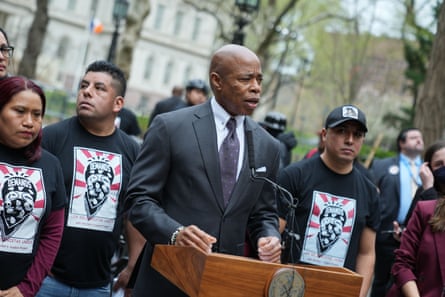
Lawmakers are worried too. The authority that manages New York’s public housing proposed an e-bike ban on its property this year but backed down after an outcry from low-income residents. On Monday, the city council held a hearing where legislators touted bills to combat the battery fires, including a proposal to outlaw the sale of secondhand electric vehicle batteries, and another to ban all batteries that haven’t been approved by a nationally recognized testing lab.
If passed, that measure would force riders to use batteries such as those certified by the Illinois-based Underwriters Laboratory (UL), which subjects e-bikes and their batteries to rigorous testing on issues ranging from their performance under extreme temperatures to how easily fire spreads between cells. Manufacturers have to pay a “nominal” cost to undergo testing, said Robert Slone, UL’s chief scientist, but “we see a lot of manufacturers showing interest in certifying the batteries”. UL sent a statement to the city council supporting the proposed measures, though it said a total ban on used batteries could be overkill: “When done correctly, batteries can be safely repurposed.”
Some of the most highly regarded e-bike batteries are the UL-certified batteries and motors made by Bosch, which a spokesperson said “are designed for daily use” and “will meet the daily demands of delivery workers”. But Bosch batteries are only found in higher-end bike brands that are out of reach for many delivery workers.
That’s why workers say what’s needed from the city isn’t just new restrictions but more assistance.
For more than a year, Los Deliveristas Unidos has been pushing for the creation of new bike-charging hubs in New York’s high-traffic areas. The workers scored a major victory in October, when Senator Chuck Schumer pledged $1m in federal infrastructure funding to launch the project in New York City, starting with the conversion of an unused downtown newsstand. The Deliveristas have also proposed creating compact solar-powered charging stations in parking spaces outside popular restaurants. But Ajche said the organization doesn’t expect to see the first hub up and running until next summer. “Working with the city’s not easy,” he said. “Everything takes a lot of time.”

Mayor Eric Adams joins members of Los Deliveristas Unidos to celebrate new protections in the food delivery industry, in April.
Photograph: John Nacion/NurPhoto/Rex/Shutterstock
Solomon, the delivery worker, has joined an informal group called Safer Charging, which advocates creating a “battery swap” network modeled after similar systems in countries such as Taiwan. That would allow workers to put their spent battery packs into shared outdoor charging cabinets and grab new ones, leaving the maintenance of the batteries to a professional team.
Something else that would make a big difference for workers is better intel. “Each fire happened, they say it’s an e-bike, but we don’t know which one it is,” Ajche said. “There’s a lot of missing information.” What would be more useful, he said, would be if the fire department committed resources to testing and sharing details about which batteries were safe to use, so that workers could make more informed decisions.
Ajche added that the city should pass laws requiring that gig companies pay delivery workers a “living wage”. According to Los Deliveristas, that would be $30 an hour, an amount that would help offset delivery workers’ substantial equipment and maintenance costs, especially if they’re required to upgrade their batteries down the line. “You already have to invest almost $4,000 to be a delivery worker,” he said. “And if they’re regulating the types of batteries, the price of everything is gonna get so high.”
Uber and Doordash did not respond to questions about whether they would increase payments to workers hoping to buy certified e-bike batteries. But an Uber spokesperson provided a statement that it sent to the city council in support of the new proposals. “Nobody one should have to choose between their safety and their livelihood,” the statement said.
Solomon, the delivery worker, has joined an informal group called Safer Charging, which advocates creating a “battery swap” network modeled after similar systems in countries such as Taiwan. That would allow workers to put their spent battery packs into shared outdoor charging cabinets and grab new ones, leaving the maintenance of the batteries to a professional team.
Something else that would make a big difference for workers is better intel. “Each fire happened, they say it’s an e-bike, but we don’t know which one it is,” Ajche said. “There’s a lot of missing information.” What would be more useful, he said, would be if the fire department committed resources to testing and sharing details about which batteries were safe to use, so that workers could make more informed decisions.
Ajche added that the city should pass laws requiring that gig companies pay delivery workers a “living wage”. According to Los Deliveristas, that would be $30 an hour, an amount that would help offset delivery workers’ substantial equipment and maintenance costs, especially if they’re required to upgrade their batteries down the line. “You already have to invest almost $4,000 to be a delivery worker,” he said. “And if they’re regulating the types of batteries, the price of everything is gonna get so high.”
Uber and Doordash did not respond to questions about whether they would increase payments to workers hoping to buy certified e-bike batteries. But an Uber spokesperson provided a statement that it sent to the city council in support of the new proposals. “Nobody one should have to choose between their safety and their livelihood,” the statement said.
No comments:
Post a Comment